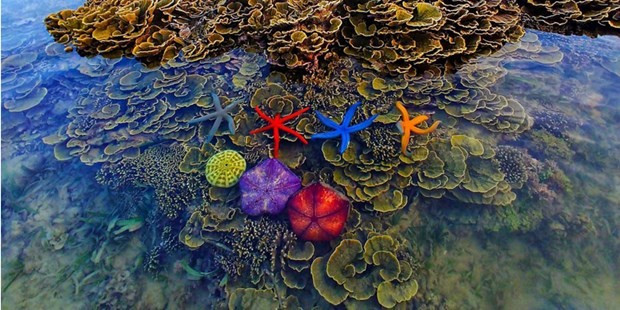 |
|
Hon Yen coral reef in Phu Yen (Source: Industry and Trade Magazine) |
Statistics from the Ministry of Natural Resources and Environment showed that Vietnam annually disposes between 0.28 and 0.73 million tonnes of plastic waste to the sea, of which only 27 percent are recycled and reused.
In its resolution dated October 22, 2018, on a sustainable development strategy of Vietnam's marine economy to 2030, the 13th Party Central Committee set a goal for coastal localities to collect and treat 100 percent of their hazardous waste and daily-life solid waste up to environmental standards.
In August 2020, the Quang Ngai People’s Committee issued a plan on marine plastic waste management for 2021-2025, aiming to halve the amount of the waste and push the number of tourism-service businesses saying no to single-use plastic products and non-biodegradable plastic bags to 70 percent.
To this end, a host of measures has so far been carried out, focusing on the development of related human resources, finance, and technology, with polluters subject to hefty fines.
Quang Ngai has determined to control and treat plastic waste at the source; and work toward completely eliminating plastic waste and hard-to-decompose plastic bags at trade centers and supermarkets. It is preparing infrastructure serving a plan for sorting waste at source and going to collect household waste fees across localities simultaneously.
Meanwhile, Phu Yen has sought cooperation with international organisations to implement myriad environmental protection projects, including those on public capacity building serving the conservation of the Hon Yen coral reefs, and plastic waste collection at sea with the consent of the fishing community.
Notably, a project on plastic waste management for 2022-2025, sponsored by the World Wide Fund for Nature (WWF) Vietnam, is underway in Phu Yen, initially witnessing the formation of such green models as no-plastic-waste schools and waste-sorting locations in wet markets and residential areas.
Serving the similar cause, Binh Dinh and the United Nations Development Programme (UNDP) have signed a memorandum of understanding on multi-sectoral cooperation, which involves their teamwork in circular economy and waste management, blue economy, climate change adaptation, and biodiversity, among many other fields.
Source: SGGP